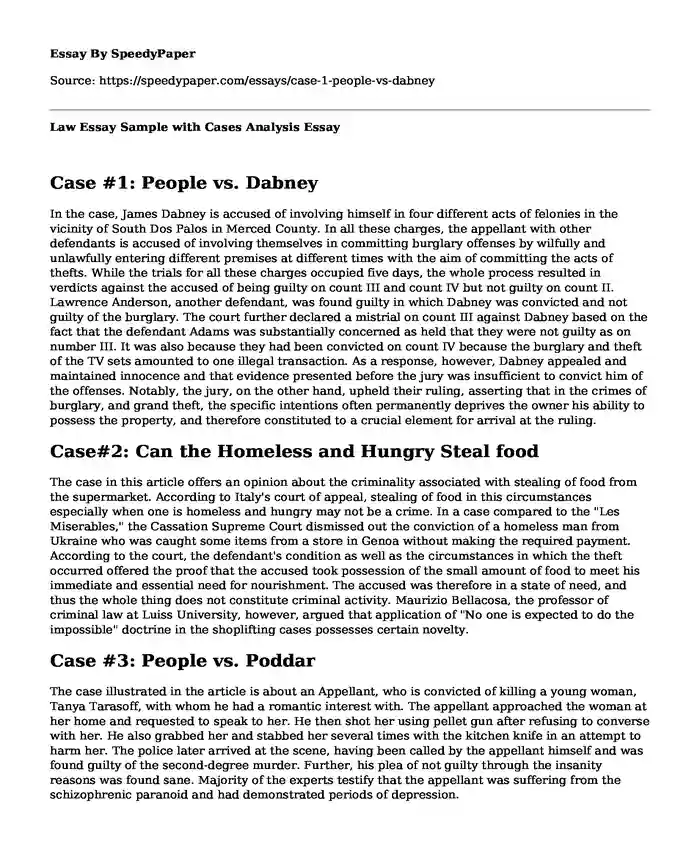Case #1: People vs. Dabney
In the case, James Dabney is accused of involving himself in four different acts of felonies in the vicinity of South Dos Palos in Merced County. In all these charges, the appellant with other defendants is accused of involving themselves in committing burglary offenses by wilfully and unlawfully entering different premises at different times with the aim of committing the acts of thefts. While the trials for all these charges occupied five days, the whole process resulted in verdicts against the accused of being guilty on count III and count IV but not guilty on count II. Lawrence Anderson, another defendant, was found guilty in which Dabney was convicted and not guilty of the burglary. The court further declared a mistrial on count III against Dabney based on the fact that the defendant Adams was substantially concerned as held that they were not guilty as on number III. It was also because they had been convicted on count IV because the burglary and theft of the TV sets amounted to one illegal transaction. As a response, however, Dabney appealed and maintained innocence and that evidence presented before the jury was insufficient to convict him of the offenses. Notably, the jury, on the other hand, upheld their ruling, asserting that in the crimes of burglary, and grand theft, the specific intentions often permanently deprives the owner his ability to possess the property, and therefore constituted to a crucial element for arrival at the ruling.
Case#2: Can the Homeless and Hungry Steal food
The case in this article offers an opinion about the criminality associated with stealing of food from the supermarket. According to Italy's court of appeal, stealing of food in this circumstances especially when one is homeless and hungry may not be a crime. In a case compared to the "Les Miserables," the Cassation Supreme Court dismissed out the conviction of a homeless man from Ukraine who was caught some items from a store in Genoa without making the required payment. According to the court, the defendant's condition as well as the circumstances in which the theft occurred offered the proof that the accused took possession of the small amount of food to meet his immediate and essential need for nourishment. The accused was therefore in a state of need, and thus the whole thing does not constitute criminal activity. Maurizio Bellacosa, the professor of criminal law at Luiss University, however, argued that application of "No one is expected to do the impossible" doctrine in the shoplifting cases possesses certain novelty.
Case #3: People vs. Poddar
The case illustrated in the article is about an Appellant, who is convicted of killing a young woman, Tanya Tarasoff, with whom he had a romantic interest with. The appellant approached the woman at her home and requested to speak to her. He then shot her using pellet gun after refusing to converse with her. He also grabbed her and stabbed her several times with the kitchen knife in an attempt to harm her. The police later arrived at the scene, having been called by the appellant himself and was found guilty of the second-degree murder. Further, his plea of not guilty through the insanity reasons was found sane. Majority of the experts testify that the appellant was suffering from the schizophrenic paranoid and had demonstrated periods of depression.
Cite this page
Law Essay Sample with Cases Analysis. (2022, Mar 23). Retrieved from https://speedypaper.net/essays/case-1-people-vs-dabney
Request Removal
If you are the original author of this essay and no longer wish to have it published on the SpeedyPaper website, please click below to request its removal:
- Quality of Service Essay Sample
- Free Essay on the U.S. Policy Issues Towards Latin America
- Geography Essay Sample: Belgium. Quebec Province.
- Free Essay on Public Relation Case Studies
- Essay Sample on Accounting Theory and Its Application to Financial Reporting
- Essay Sample about the Challenges Faced after Migrating to the United States from Ivory Coast
- Essay Sample on Rationalizing Crime: An Economic Perspective on Bank Robberies and Societal Implications
Popular categories





